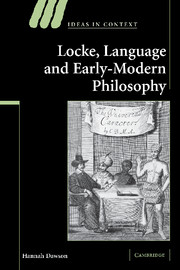
-
Select format
-
- Publisher:
- Cambridge University Press
- Publication date:
- September 2009
- June 2007
- ISBN:
- 9780511490484
- 9780521852715
- 9781107403024
- Dimensions:
- (228 x 152 mm)
- Weight & Pages:
- 0.73kg, 380 Pages
- Dimensions:
- (229 x 152 mm)
- Weight & Pages:
- 0.51kg, 380 Pages
- Subjects:
- History of Ideas, History, Early Modern Philosophy, Philosophy, History of Ideas and Intellectual History
- Series:
- Ideas in Context (76)
You may already have access via personal or institutional login- Subjects:
- History of Ideas, History, Early Modern Philosophy, Philosophy, History of Ideas and Intellectual History
- Series:
- Ideas in Context (76)
Book description
In a powerful and original contribution to the history of ideas, Hannah Dawson explores the intense preoccupation with language in early-modern philosophy, and presents an analysis of John Locke's critique of words. By examining a broad sweep of pedagogical and philosophical material from antiquity to the late seventeenth century, Dr Dawson explains why language caused anxiety in various writers. Locke, Language and Early-Modern Philosophy demonstrates that developments in philosophy, in conjunction with weaknesses in linguistic theory, resulted in serious concerns about the capacity of words to refer to the world, the stability of meaning, and the duplicitous power of words themselves. Dr Dawson shows that language so fixated all manner of early-modern authors because it was seen as an obstacle to both knowledge and society. She thereby uncovers a novel story about the problem of language in philosophy, and in the process reshapes our understanding of early-modern epistemology, morality and politics.
Contents
Metrics
Altmetric attention score
Full text views
Full text views help Loading metrics...
Loading metrics...
* Views captured on Cambridge Core between #date#. This data will be updated every 24 hours.
Usage data cannot currently be displayed.
Accessibility standard: Unknown
Why this information is here
This section outlines the accessibility features of this content - including support for screen readers, full keyboard navigation and high-contrast display options. This may not be relevant for you.
Accessibility Information
Accessibility compliance for the PDF of this book is currently unknown and may be updated in the future.


